- Statement of Cost of Goods Sold: Prepare the statement of cost of goods sold in the COGS tab of the workbook. Remember to show your work using calculations to the side of the table or using appropriate formulas in the table.
- Income Statement: Use the given revenue data to prepare the Income Statement tab table and calculate the net income. Remember to show your work using calculations to the side of the table or using appropriate formulas in the table.
- Variance Analysis: Prepare the data in the Variances tab to determine whether the variances are favorable or unfavorable. Remember to show your work using calculations to the side of the table or using appropriate formulas in the table.
- Complete the data table for the variances by entering the budgeted (standard) and actual labor and material values. Remember to use the estimates for expected sales from your Milestone Two assignment.
- Determine the variances for direct labor and direct materials in the Variances tab.
- Evaluate the significance of the variances in the Variances tab, and mark them as favorable or unfavorable.
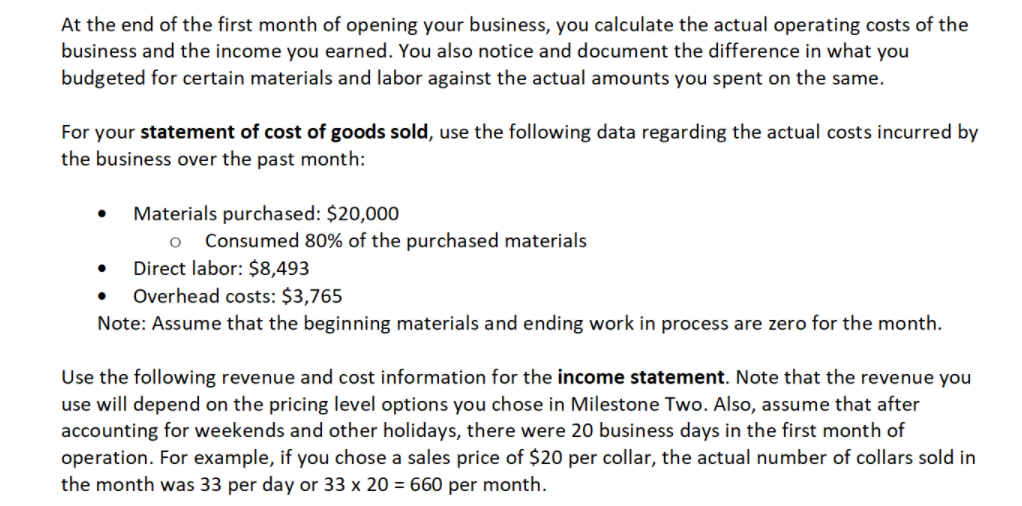
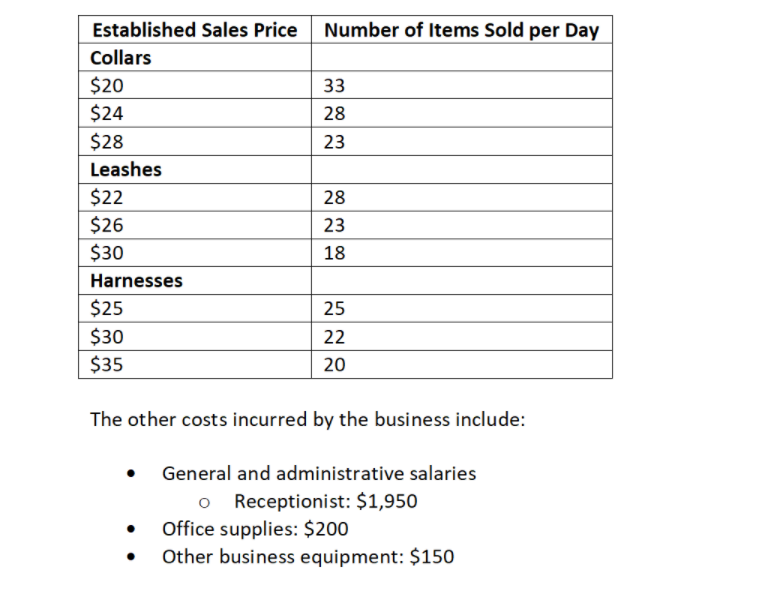
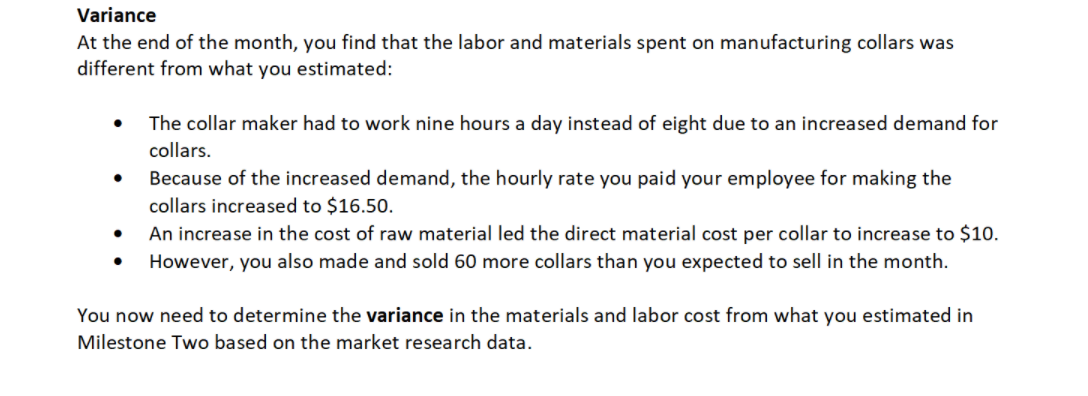
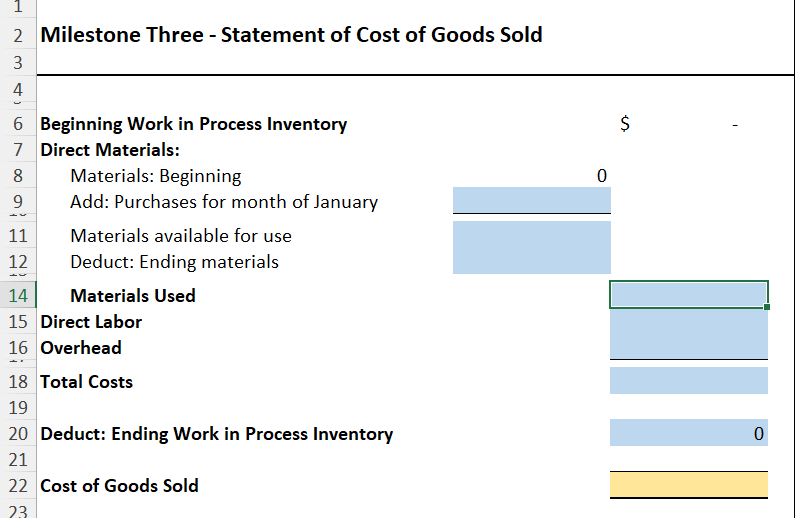
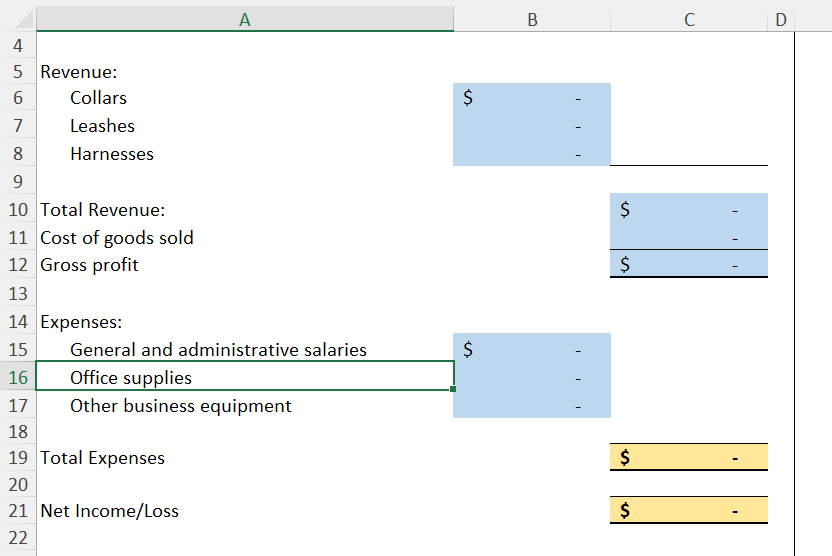
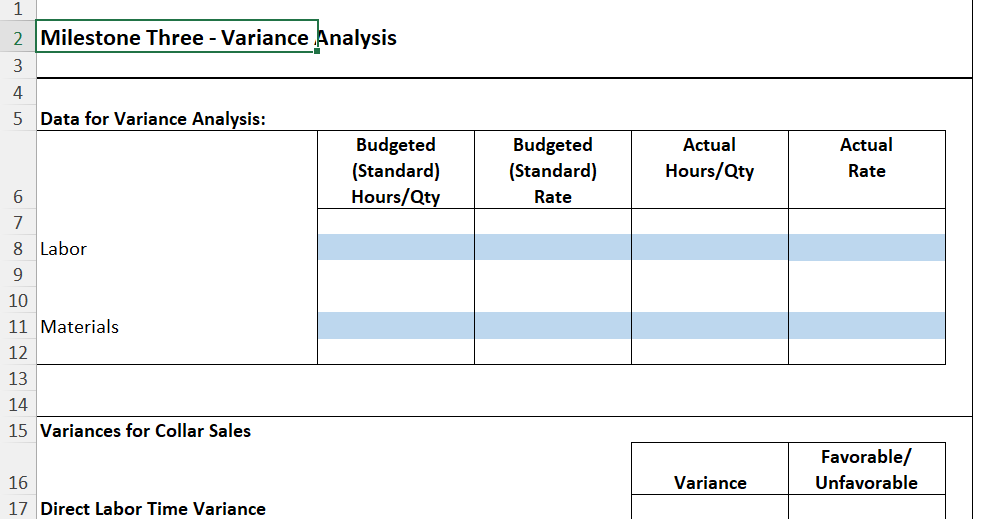
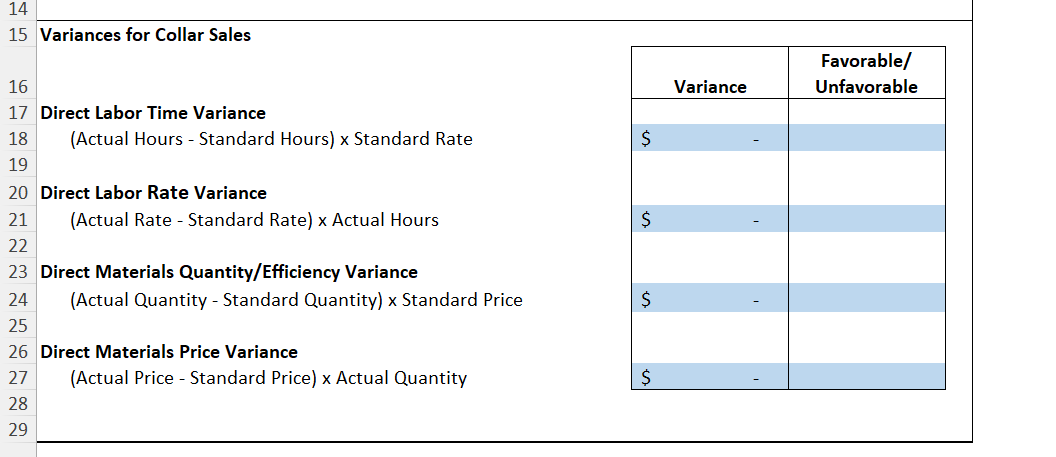
At the end of the first month of opening your business, you calculate the actual operating costs of the business and the income you earned. You also notice and document the difference in what you budgeted for certain materials and labor against the actual amounts you spent on the same. For your statement of cost of goods sold, use the following data regarding the actual costs incurred by the business over the past month: O Materials purchased: $20,000 Consumed 80% of the purchased materials Direct labor: $8,493 Overhead costs: $3,765 Note: Assume that the beginning materials and ending work in process are zero for the month. . Use the following revenue and cost information for the income statement. Note that the revenue you use will depend on the pricing level options you chose in Milestone Two. Also, assume that after accounting for weekends and other holidays, there were 20 business days in the first month of operation. For example, if you chose a sales price of $20 per collar, the actual number of collars sold in the month was 33 per day or 33 x 20 = 660 per month. Established Sales Price Number of Items Sold per Day Collars $20 33 $24 28 $28 23 Leashes $22 28 $26 23 $30 18 Harnesses $25 25 $30 22 $35 20 The other costs incurred by the business include: General and administrative salaries o Receptionist: $1,950 Office supplies: $200 Other business equipment: $150 Variance At the end of the month, you find that the labor and materials spent on manufacturing collars was different from what you estimated: . The collar maker had to work nine hours a day instead of eight due to an increased demand for collars. Because of the increased demand, the hourly rate you paid your employee for making the collars increased to $16.50. An increase in the cost of raw material led the direct material cost per collar to increase to $10. However, you also made and sold 60 more collars than you expected to sell in the month. . . You now need to determine the variance in the materials and labor cost from what you estimated in Milestone Two based on the market research data. 1 2 Milestone Three - Statement of Cost of Goods Sold 3 $ 0 } 12 4 6 Beginning Work in Process Inventory 7 Direct Materials: 8 Materials: Beginning 9 Add: Purchases for month of January 11 Materials available for use Deduct: Ending materials 14 Materials Used 15 Direct Labor 16 Overhead 18 Total Costs 19 20 Deduct: Ending Work in Process Inventory 21 22 Cost of Goods Sold 23 0 11 A B D $ $ $ 4 5 Revenue: 6 Collars 7 Leashes 8 Harnesses 9 10 Total Revenue: 11 Cost of goods sold 12 Gross profit 13 14 Expenses: 15 General and administrative salaries 16 Office supplies 17 Other business equipment 18 19 Total Expenses 20 21 Net Income/Loss 22 $ - $ $ - 2 Milestone Three - Variance Analysis 3 4 5 Data for Variance Analysis: Budgeted (Standard) Hours/Qty Budgeted (Standard) Rate Actual Hours/Qty Actual Rate 6 7 8 Labor 9 10 11 Materials 12 13 14 15 Variances for Collar Sales Favorable/ Unfavorable Variance 16 17 Direct Labor Time Variance 14 15 Variances for Collar Sales Favorable/ Unfavorable Variance $ $ 16 17 Direct Labor Time Variance 18 (Actual Hours - Standard Hours) x Standard Rate 19 20 Direct Labor Rate Variance 21 (Actual Rate - Standard Rate) x Actual Hours 22 23 Direct Materials Quantity/Efficiency Variance 24 (Actual Quantity - Standard Quantity) x Standard Price 25 26 Direct Materials Price Variance 27 (Actual Price - Standard Price) Actual Quantity 28 29 $ $ At the end of the first month of opening your business, you calculate the actual operating costs of the business and the income you earned. You also notice and document the difference in what you budgeted for certain materials and labor against the actual amounts you spent on the same. For your statement of cost of goods sold, use the following data regarding the actual costs incurred by the business over the past month: O Materials purchased: $20,000 Consumed 80% of the purchased materials Direct labor: $8,493 Overhead costs: $3,765 Note: Assume that the beginning materials and ending work in process are zero for the month. . Use the following revenue and cost information for the income statement. Note that the revenue you use will depend on the pricing level options you chose in Milestone Two. Also, assume that after accounting for weekends and other holidays, there were 20 business days in the first month of operation. For example, if you chose a sales price of $20 per collar, the actual number of collars sold in the month was 33 per day or 33 x 20 = 660 per month. Established Sales Price Number of Items Sold per Day Collars $20 33 $24 28 $28 23 Leashes $22 28 $26 23 $30 18 Harnesses $25 25 $30 22 $35 20 The other costs incurred by the business include: General and administrative salaries o Receptionist: $1,950 Office supplies: $200 Other business equipment: $150 Variance At the end of the month, you find that the labor and materials spent on manufacturing collars was different from what you estimated: . The collar maker had to work nine hours a day instead of eight due to an increased demand for collars. Because of the increased demand, the hourly rate you paid your employee for making the collars increased to $16.50. An increase in the cost of raw material led the direct material cost per collar to increase to $10. However, you also made and sold 60 more collars than you expected to sell in the month. . . You now need to determine the variance in the materials and labor cost from what you estimated in Milestone Two based on the market research data. 1 2 Milestone Three - Statement of Cost of Goods Sold 3 $ 0 } 12 4 6 Beginning Work in Process Inventory 7 Direct Materials: 8 Materials: Beginning 9 Add: Purchases for month of January 11 Materials available for use Deduct: Ending materials 14 Materials Used 15 Direct Labor 16 Overhead 18 Total Costs 19 20 Deduct: Ending Work in Process Inventory 21 22 Cost of Goods Sold 23 0 11 A B D $ $ $ 4 5 Revenue: 6 Collars 7 Leashes 8 Harnesses 9 10 Total Revenue: 11 Cost of goods sold 12 Gross profit 13 14 Expenses: 15 General and administrative salaries 16 Office supplies 17 Other business equipment 18 19 Total Expenses 20 21 Net Income/Loss 22 $ - $ $ - 2 Milestone Three - Variance Analysis 3 4 5 Data for Variance Analysis: Budgeted (Standard) Hours/Qty Budgeted (Standard) Rate Actual Hours/Qty Actual Rate 6 7 8 Labor 9 10 11 Materials 12 13 14 15 Variances for Collar Sales Favorable/ Unfavorable Variance 16 17 Direct Labor Time Variance 14 15 Variances for Collar Sales Favorable/ Unfavorable Variance $ $ 16 17 Direct Labor Time Variance 18 (Actual Hours - Standard Hours) x Standard Rate 19 20 Direct Labor Rate Variance 21 (Actual Rate - Standard Rate) x Actual Hours 22 23 Direct Materials Quantity/Efficiency Variance 24 (Actual Quantity - Standard Quantity) x Standard Price 25 26 Direct Materials Price Variance 27 (Actual Price - Standard Price) Actual Quantity 28 29 $ $













